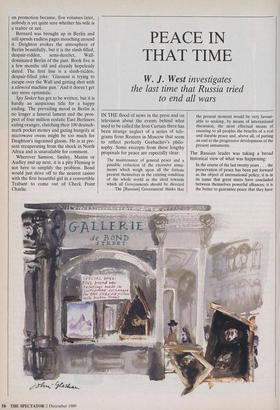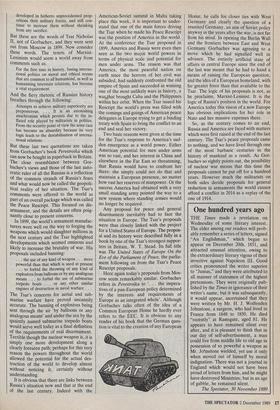PEACE IN THAT TIME
W. J. West investigates the last time that Russia tried to end all wars IN THE flood of news in the press and on television about the events behind what used to be called the Iron Curtain there has been strange neglect of a series of tele- grams from Reuters in Moscow that seem to reflect perfectly Gorbachev's philo- sophy. Some excerpts from these lengthy proposals for peace are especially clear:
The maintenance of general peace and a possible reduction of the excessive arma- ments which weigh upon all the fiations present themselves in the existing condition of the whole world as the ideal towards which all Governments should be directed . . . The [Russian] Government thinks that the present moment would be very favour- able to seeking, by means of international discussion, the most effectual means of ensuring to all peoples the benefits of a real and durable peace and, above all, of putting an end to the progressive development of the present armaments.
The Russian leader was taking a broad historical view of what was happening: In the course of the last twenty years . . . the preservation of peace has been put forward as the object of international policy; it is in its name that great states have concluded between themselves powerful alliances; it is the better to guarantee peace that they have
developed in hitherto unprecedented prop- ortions their military forces, and still con- tinue to increase them without shrinking from any sacrifice.
But these are the words of Tsar Nicholas II, not of Gorbachev, and they were sent out from Moscow in 1899. Now consider these words. The tenets of Marxist- Leninism would seem a world away from comments such as:
For the first time in history, basing interna- tional politics on moral and ethical norms that are common to all humankind, as well as humanising interstate relations, has become a vital requirement.
And the fiery rhetoric of Russian history breathes through the following:
Attempts to achieve military superiority are preposterous. . . . It is an astonishing anachronism which persists due to the in- flated role played by militarists in politics. From the security point of view the arms race has become an absurdity because its very logic leads to the destabilisation of interna- tional relations.
But these last two quotations are taken from Gorbachev's book Perestroika which can now be bought in paperback in Britain. The close resemblance between Gor- bachev's views and those of the last auto- cratic ruler of all the Russias is a reflection of the common strands of Russia's fears and what would now be called the geopoli- tical reality of her situation. The Tsar's comments were offered to the world as part of an overall package which was called the Peace Rescript. This focused on dis- armament, and the details are often poig- nantly close to present concerns.
In 1899, the world's armament manufac- turers were well on the way to forging the weapons which would slaughter millions in the next century and the Tsar highlighted developments which seemed ominous and likely to increase the brutality of war. His proposals included banning: . . . the use of any kind of weapon . . . more powerful than that which is used at present . . . to forbid the throwing of any kind of explosives from balloons or by any analogous means . . to forbid the use of submarine torpedo boats . . or any other similar engines of destruction in naval warfare .
The Tsar's concerns for aerial and sub- marine warfare have proved uncannily accurate. The banning of explosives being sent through the air 'by balloons or any analogous means' and under the sea by the quaintly named submarine torpedo boats would serve well today as a final definition of the requirements of real disarmament. Terrible though the nuclear weapon is, it is simply one more development along a clearly foreseen path; perhaps for this very reason the powers throughout the world allowed the potential for the actual des- truction of the world to develop almost without noticing it, certainly without understanding.
It is obvious that there are links between Russia's situation now and that at the end of the last century. Indeed with the American-Soviet summit in Malta taking place this week, it is important to under- stand that one of the main forces driving the Tsar when he made his Peace Rescript was the position of America in the world. At the conference the Tsar proposed in 1899, America and Russia were even then seen as the two major world powers in terms of physical scale and potential for men under arms. The reason was that America, the most peaceful nation on earth since the horrors of her civil war subsided, had suddenly confronted the old empire of Spain and succeeded in winning one of the most unlikely wars in history, a warhat brought Cuba and the Philippines within her orbit. When the Tsar issued his Rescript the world's press was filled with the comings and goings of American peace delegates in Europe trying to get a binding treaty with Spain to bring the conflict to an end and seal her victory.
Two basic reasons were given at the time for the Tsar's response to America's sud- den emergence as a world power. Either American potential for men under arms was so vast, and her interest in China and elsewhere in the Far East so threatening, that Russia would have to confront her there: she simply could not do that and maintain a European presence, no matter how vast her reserves of manpower. Or the success America had obtained with a very small standing army pointed the way to a new system where standing armies would no longer be required. Any proposal for peace and general disarmament inevitably had to face the situation in Europe. The Tsar's proposals were thus closely linked with the project for a United States of Europe. The propos- al and its history were described fully in a book by one of the Tsar's strongest suppor- ters in Britain, W. T. Stead. Its full title was The United States of Europe On the Eve of the Parliament of Peace, the parlia- ment following on from the Tsar's Peace Rescript proposals.
Here again today's proposals from Mos- cow seem remarkably similar. Gorbachev refers in Perestroika to `. . . the impera- tives of a pan-European policy determined by the interests and requirements of Europe as an integrated whole'. Although Gorbachev talks often of the idea of a Common European Home he hardly ever refers to the EEC. It is obvious to any reader of his book that the German ques- tion is vital to the creation of any European Home; he calls for closer ties with West Germany and clearly the question of a reunited Germany, an aim of Soviet policy anyway in the years after the war, is not far from his mind. In opening the Berlin Wall and the frontiers between East and West Germany Gorbachev was agreeing to a move which he had signalled well in advance. The entirely artificial state of affairs in central Europe since the end of the last war meant that he had to hand a means of raising the European question, and the idea of a European homeland, with far greater force than that available to the Tsar. The logic of his proposals is not, as he proclaims, Marxist-Leninist. It is the logic of Russia's position in the world. For America today this vision of a new Europe has obvious implications for her role in Nato and her massive expenses there.
So, as the century comes to an end, Russia and America are faced with matters which were first raised at the end of the last century. The Tsar's peace proposals came to nothing, and we have lived through one of the most barbaric centuries in the history of mankind as a result. As Gor- bachev so rightly points out, the possibility of nuclear war means that this time the proposals cannot be put off for a hundred years. However much the militarists on both sides deride proposals for general reduction in armaments the world cannot afford a conflict in 2014 as a replay of the one of 1914.











































































 Previous page
Previous page